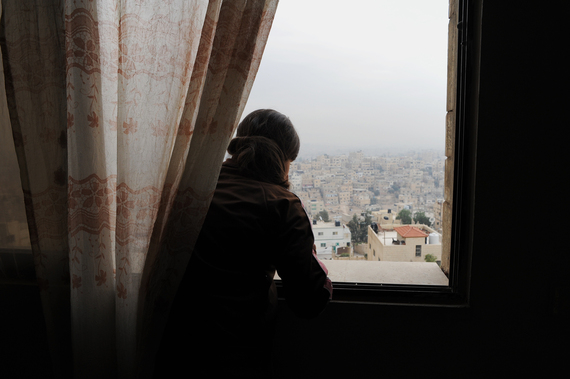
"[Before the war] life was prosperous," explained Walid,* a Syrian refugee in Jordan. "I had money. I had my routines. Things were normal and organized."
Walid was married, raising children, and owned a successful business. Then, as events unfolded in his hometown of Homs in early 2012, everything changed.
"These things that were happening around me were only things that seem to happen in movies -- American movies," he reflected. "I didn't believe it. I never thought I would see these things."
A civilian who happened to be in the wrong place at the wrong time, Walid was shot twice while exiting a mosque. His 12-year-old nephew was killed by a sniper. He and his daughters hid in a drainage canal among dead bodies during a bombing campaign. He was stopped at a check point and subsequently taken to prison. He was held for 45 days until his family paid a bribe for his release. They used "every kind of torture," he said.
Walid and his family are among the 4.4 million Syrian refugees who have been forced from their homes and country in search of peace and safety. In a report released earlier this month, Reclaiming Hope, Dignity and Respect: Syrian and Iraqi Torture Survivors in Jordan, the Center for Victims of Torture (CVT) details patterns of torture and human rights abuses endured by Syrians and Iraqis in their home countries, as well as the challenges they are facing as refugees in Jordan.
In interviews with 64 former CVT clients living in Jordan conducted between January 2014 and October 2015, CVT found that the daily stresses of life as a refugee -- including the loss of self-sufficiency and individual agency -- were overwhelming. With each passing month in exile, the hopes they once had for a better future are slipping away.
While many refugees describe feeling much safer in Jordan than Syria, life as a refugee is extremely difficult: humanitarian assistance is limited, cost of living is high and most refugees are strictly prohibited from working.
Few refugees see a future for themselves or their families in Jordan. On the other hand, to return to Syria at this point remains equivalent to suicide. Even while many Syrian refugees still yearn for a chance to rebuild what they've lost and return to a home they love, as the war approaches its fifth year and becomes increasingly complex, they are finding it harder and harder to fathom return as an option for the future.
As Amira,* a Syrian woman, explained, "All we want is to return -- to go home. It's very hard to be outside and so far away. Our families and communities and people are all dispersed. We want to be reunited and together again." However, she also noted, "We have lost so much -- our homes, our businesses, they are all destroyed. What are we returning to?"
Consequently, for many refugees, the only elusive hope left seems to be in a third country - Germany, Sweden, Norway, the United States, Canada, Australia, etc. And, through both formal and informal channels, Syrian refugees are seeking hope where they can find it.
The UN High Commissioner for Refugees (UNHCR) reports that between March 2011 and November 2015, 681,713 asylum applications were filed by Syrians in Europe. UNHCR estimates that 10% (over 400,000) of Syrian refugees living in neighboring countries are in need of resettlement. Canada has pledged to accept 25,000 Syrian refugees by the end of February 2016 and 50,000 by the end of the calendar year. UNHCR has referred over 22,000 cases for resettlement to the United States but almost 90% of those cases remain under consideration. As of late December 2015, less than 2,600 Syrians had arrived in the United States since the beginning of the Syrian conflict.
In order to better address the scale and severity of the Syrian refugee crisis -- and give Syrian refugees something to hope for -- resettlement countries, including the United States, must increase the number of individuals and families they are welcoming.
The U.S. Refugee Admissions Program is the most robust in the world. The security background and vetting process that refugees go through is the most rigorous of all non-citizens entering the United States. Moreover, Syrian refugees undergo an enhanced screening process that includes an additional review. We cannot let political tensions and concerns about security to be an excuse for the United States to do less than it can and should. The United States can resettle Syrian refugees and simultaneously protect Americans from external threats to our communities and national security.
Resettlement is an important and lifesaving option for a small number of highly vulnerable refugees, but it will never be the only solution. For the majority of refugees who will never have the opportunity to be resettled, conditions in refugee host communities must improve. As a first step, Jordan and other refugee host countries should allow refugees to legally work so that they may have the opportunity to support their families.
Ultimately, the solution for Syrians will have to come through a peace process that creates the conditions for refugees to return home safely and voluntarily. Any negotiated peace agreement must include a path for holding perpetrators of human rights violations and war crimes accountable along with a major national rebuilding effort. Without that, as Amira asked, "What are we returning to?"
*Name changed to protect identity.

